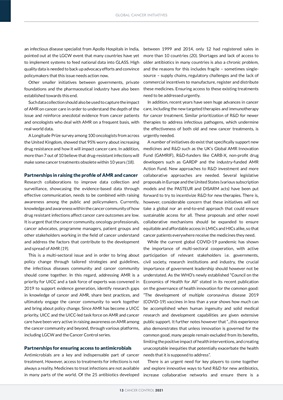
GLOBAL CANCER INITIATIVES
13 CANCER CONTROL 2021
between 1999 and 2014, only 12 had registered sales in
more than 10 countries (20). Shortages and lack of access to
older antibiotics in many countries is also a chronic problem,
and the reasons for this includes fragile - sometimes singlesource - supply chains,
regulatory challenges and the lack of
commercial incentives to manufacture, register and distribute
these medicines. Ensuring access to these existing treatments
need to be addressed urgently.
In addition, recent years have seen huge advances in cancer
care, including the new targeted therapies and immunotherapy
for cancer treatment. Similar prioritization of R&D for newer
therapies to address infectious pathogens, which undermine
the effectiveness of both old and new cancer treatments, is
urgently needed.
A number of initiatives do exist that specifically support new
medicines and R&D such as the UK's Global AMR Innovation
Fund (GAMRIF), R&D-funders like CARB-X, non-profit drug
developers such as GARDP and the industry-funded AMR
Action Fund. New approaches to R&D investment and more
collaborative approaches are needed. Several legislative
proposals in Europe and the United States (various subscription
models and the PASTEUR and DISARM acts) have been put
forward to try to incentivize R&D for new therapies. There is,
however, considerable concern that these initiatives will not
take a global nor an end-to-end approach that could ensure
sustainable access for all. These proposals and other novel
collaborative mechanisms should be expanded to ensure
equitable and affordable access in LMICs and HICs alike, so that
cancer patients everywhere receive the medicines they need.
While the current global COVID-19 pandemic has shown
the importance of multi-sectoral cooperation, with active
participation of relevant stakeholders i.e. governments,
civil society, research institutions and industry, the crucial
importance of government leadership should however not be
understated. As the WHO's newly established "Council on the
Economics of Health for All" stated in its recent publication
on the governance of health innovation for the common good:
"The development of multiple coronavirus disease 2019
(COVID-19) vaccines in less than a year shows how much can
be accomplished when human ingenuity and solid medical
research and development capabilities are given extensive
public support. It further notes however that "...this experience
also demonstrates that unless innovation is governed for the
common good, many people remain excluded from its benefits,
limiting the positive impact of health interventions, and creating
unacceptable inequities that potentially exacerbate the health
needs that it is supposed to address".
There is an urgent need for key players to come together
and explore innovative ways to fund R&D for new antibiotics,
increase collaborative networks and ensure there is a
an infectious disease specialist from Apollo Hospitals in India,
pointed out at the LGCW event that many countries have yet
to implement systems to feed national data into GLASS. High
quality data is needed to back up advocacy efforts and convince
policymakers that this issue needs action now.
Other smaller initiatives between governments, private
foundations and the pharmaceutical industry have also been
established towards this end.
Such data collection should also be used to capture the impact
of AMR on cancer care in order to understand the depth of the
issue and reinforce anecdotal evidence from cancer patients
and oncologists who deal with AMR on a frequent basis, with
real-world data.
A Longitude Prize survey among 100 oncologists from across
the United Kingdom, showed that 95% worry about increasing
drug resistance and how it will impact cancer care. In addition,
more than 7 out of 10 believe that drug-resistant infections will
make some cancer treatments obsolete within 10 years (18).
Partnerships in raising the profile of AMR and cancer
Research collaborations to improve data collection and
surveillance, showcasing the evidence-based data through
effective communication, needs to be combined with raising
awareness among the public and policymakers. Currently,
knowledge and awareness within the cancer community of how
drug resistant infections affect cancer care outcomes are low.
It is urgent that the cancer community, oncology professionals,
cancer advocates, programme managers, patient groups and
other stakeholders working in the field of cancer understand
and address the factors that contribute to the development
and spread of AMR (19).
This is a multi-sectoral issue and in order to bring about
policy change through tailored strategies and guidelines,
the infectious diseases community and cancer community
should come together. In this regard, addressing AMR is a
priority for UICC and a task force of experts was convened in
2019 to support evidence generation, identify research gaps
in knowledge of cancer and AMR, share best practices, and
ultimately engage the cancer community to work together
and bring about policy change. Since AMR has become a UICC
priority, UICC and the UICC-led task force on AMR and cancer
care have been very active in raising awareness on AMR among
the cancer community and beyond, through various platforms,
including LGCW and the Cancer Control series.
Partnerships for ensuring access to antimicrobials
Antimicrobials are a key and indispensable part of cancer
treatment. However, access to treatments for infections is not
always a reality. Medicines to treat infections are not available
in many parts of the world. Of the 25 antibiotics developed